


Prime Minister Rishi Sunak has said that he does not want to “hassle” families with net zero targets, following pressure from MPs in his own party to rethink eco policies.
On Monday, Mr. Sunak was pressed during a visit to Worcestershire about Tory MPs urging him to rethink the pace of net zero policies.
Mr. Sunak told reporters: “Actually I’m standing up for the British people because I’m also cognisant that we’re living through a time at the moment where inflation is high,” he said.
“That’s having an impact on household and families’ bills. I don’t want to add to that, I want to make it easier.
“So yes we’re going to make progress towards net zero but we’re going to do that in a proportionate and pragmatic way that doesn’t unnecessarily give people more hassle and more costs in their lives–that’s not what I’m interested in and prepared to do.”
On Sunday, Jacob Rees-Mogg and Danny Kruger, the co-leader of the New Conservatives, a group of Tory MPs elected since the Brexit referendum, both called for a rethink of net zero deadlines.
This was after voter concerns about the expansion of London’s ultra-low emission zone (ULEZ) pushed the party to hang on to former PM Boris Johnson’s Uxbridge and South Ruislip constituency during last week’s by-election.
Mayor Sadiq Khan’s ULEZ air pollution-cutting scheme charges motorists by the day to drive.
Labour leader Sir Keir Starmer told broadcasters on Saturday that he doesn’t think there’s “any doubt” ULEZ was to blame for the defeat.
Mr. Rees-Mogg told GB News: “What works is getting rid of unpopular, expensive green policies, and that is a real opportunity for us.”
He also proposed “getting rid” of the 2030 ban on new petrol and diesel cars.
Mr. Kruger told BBC Radio 4’s “Westminster Hour”: “We shouldn’t abandon green policies but we have got to work in a way that is sensible.
“And I think the whole population, young and old, recognise that we need a transition that is affordable and particularly affordable for working families, people who are struggling to make ends meet.
“And the cost to net zero at the moment is forecast to fall most heavily on them.
“I think we do need to bring the whole country along with us and we do need a rethink about the pace and the mechanism of the change we all want to see.”
Mr. Sunak did not directly respond to a question if the government would change its policy on banning petrol and diesel cars, signalling to some publications that it could be scrapped.
The government is committed to ending the sale of new petrol and diesel cars and vans by 2030, and from 2035 all new cars and vans must be fully zero emission at the exhaust.
However, on Monday, Foreign Office Minister Andrew Mitchell told BBC Radio 4’s “Today” that the ban will “remain in place.”
Senior environmentally-minded Tories have urged both their own party and Labour not to drop green policies in the hope of short-term electoral gains.
Chris Skidmore, the UK government’s net zero tsar, said on Sunday that it would be both “deeply regrettable” and an “abdication of responsible government” if ministers “play politics” with environmental policies.
Researcher Ben Pile who runs the campaign group Climate Debate UK told The Epoch Times by email that the consensus of the “Westminster parties has finally collided with material and political reality, forcing rethinks of net zero and other green policies in both the Conservative and Labour parties.”
“Green policies have increased the cost of living, and those policies, which are now really beginning to bite, have never been tested for democratic legitimacy,” he said.
Mr Pile noted that Londoners in Uxbridge rejecting ULEZ has signalled, perhaps for the “first time, the public’s appetite for alternatives to the establishment’s radical environmentalism.”
With political leaders and the public aware of this, he asked if parties “can rid themselves of the anti-democratic influences” which he calls “the green blob” that he says has “dominated policymaking for most of the past 30 years.”
He noted that two years ago that Mr. Sunak, then chancellor of the exchequer, at COP26, announced the alignment of financial institutions with Assets under management of $130 trillion with the “net zero agenda.”
“This is a major conflict between money and democracy, and the tasks before the PM are not straightforward,” he said, adding that “Westminster has never been so isolated from the public, and as we have seen since Brexit, the establishment’s consensus is hard to break.”
Mr. Pile claimed that the government will need Parliament’s support to make meaningful changes to net zero, and MPs from “all parties are wholly absorbed into the green worldview.”
“It’s going to take sustained and intense public pressure to force any party or government to put democracy before the green blob’s ideological agenda and its profiteering,” he said.
In terms of net zero, polling expert Sir John Curtice has previously told The Epoch Times that there is “broad public concern” regarding climate change.
But he added that “basically what the public wants is between governments and industry, is they organise the economy in such a way that then we can be virtuous without having to sacrifice too much.”
The Epoch Times contacted the prime minister’s office, 10 Downing Street, for comment.
PA Media and Lily Zhou contributed to this report.

